|
|
 |
 |
 |
 |
IISD Reporting Services (IISD RS) Coverage
IISD RS provided daily web coverage and a summary and analysis from ICN2. In order to download our reports, click the HTML or PDF icons below |
|
 |
 |
 |
 |

|
 Second International Conference on Nutrition (ICN2)
Second International Conference on Nutrition (ICN2)
19-21 November 2014 | UN Food and Agriculture Organization (FAO) headquarters, Rome, Italy |
 |
 |
 |
 |
Daily Web Coverage
(Click on the following links to see our daily webpages)
|
|
|
|
|
 |
 |
 |
 |
 |
 |
 |
 |
On Thursday, 20 November 2014, ICN2 continued with the general debate, which convened throughout the day. Roundtables convened on: policy coherence for nutrition-sensitive agriculture; nutrition in all sectors; nutrition governance; and nutrition accountability. A number of side events were also held, including on: Expo Milano 2015; and the Global Nutrition Report and Global Hunger Index.
In a special statement to ICN2, His Holiness Pope Francis said malnutrition and hunger are hindered by market priorities, the primacy of profits and financial speculation. He called for dignity not charity, and, noting the paradox of food abundance and continuing hunger, called for a more just distribution of the world’s food.
Queen Letizia of Spain said multinational corporations must work with international agencies in promoting public health, calling for a “marriage” between commercial and economic interests and political interests. She underscored that no country has managed to reverse the obesity epidemic.
Nadine Heredia, First Lady of Peru and Special Ambassador to the FAO, emphasized focusing on: farming families; genetic diversity of seeds; retention of traditional knowledge; and revision of trade policies.
|
|
 |
 |
 |
 |
|
 |
 |
 |
 |
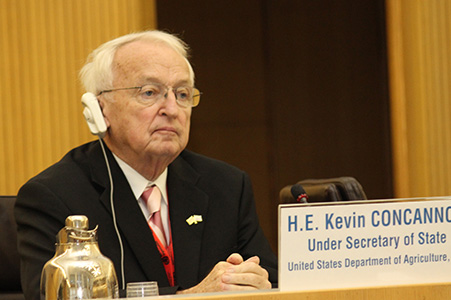 |
| Kevin Concannon, Under Secretary of State, US Department of Agriculture |
|
 |
 |
 |
 |
|
 |
 |
 |
 |
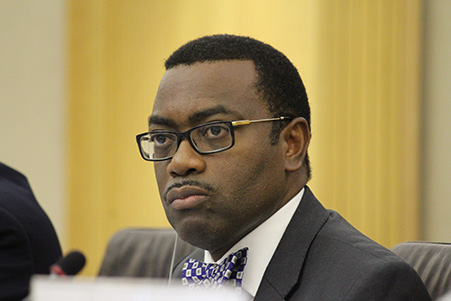 |
| Akinwumi Ayo Adesina, Minister for Agriculture and Rural Development, Nigeria |
|
 |
 |
 |
 |
|
 |
 |
 |
 |
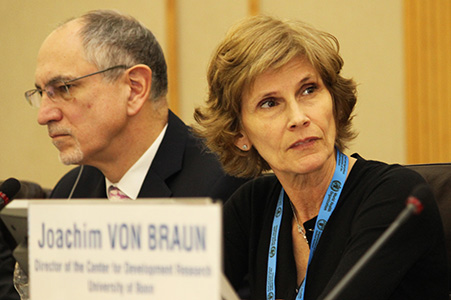 |
| Marie Ruel, International Food Policy Research Institute |
|
 |
 |
 |
 |
|
 |
 |
 |
 |
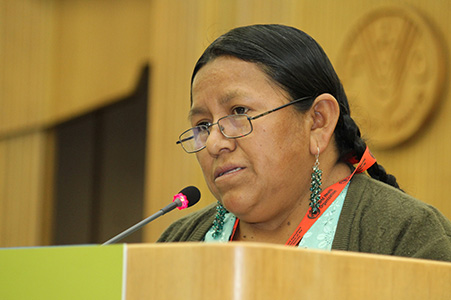 |
| Nemesia Achacollo Tola, Minister for Rural Development and Land, Bolivia |
|
 |
 |
 |
 |
|
 |
 |
 |
 |
During a morning roundtable on nutrition in all sectors, Pekka Puska, National Institute for Health and Welfare, Finland, enumerated strategies that focus on intersectoral collaboration towards better health and nutrition in all sectors, such as the UN High-Level Meeting onUN High-Level Meeting on Non-Communicable Diseases.
Talalelei Tuitama, Minister of Health of Samoa, noted contradictions between nutrition, health and trade, using the example of low-quality food dumping and the WTO’s prohibition of Samoa’s attempt to tax unhealthy food.
Lois Brown, Ministry of International Development, Canada, drew attention to the conference “Saving Every Woman, Saving Every Child” that sought to build the political commitment to reduce hunger and improve the health of these groups.
María Virginia Castillo Jara, Ministry of Health, Peru, said mining was a major source of tax revenue in her country that can be used for social benefits, including maternal and child benefits.
Enoch Hemans Cobbina, Ministry of Education, Ghana, discussed a number of school programmes in his country, including training vendors in food hygiene and nutrition, and banning the sale of sweets and candy without nutritional content.
Sarah Abdullah, University of Rome Tor Vergata and Embassy of Kuwait, noted consideration by Kuwait to remove subsidies on sugar and infant milk formula to promote breastfeeding.
In the ensuing discussion, participants raised issues related to, inter alia:banning commercials and advertisements of unhealthy foods; addressing the impacts of transgenic seeds in the post-2015 development agenda; better information about specific nutrients contained in different foods; and overconsumption of supplements. |
|
 |
 |
 |
 |
 |
 |
 |
 |
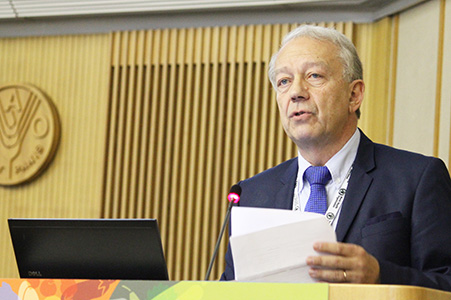 |
| Pekka Puska, Professor, National Institute for Health and Welfare, Finland |
|
 |
 |
 |
 |
|
 |
 |
 |
 |
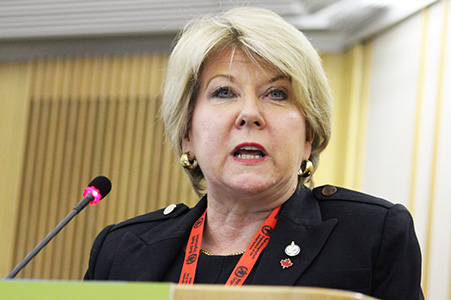 |
| Lois Brown, Parliamentary Secretary to the Minister of International Development and La Francophonie, Canada |
|
 |
 |
 |
 |
|
 |
 |
 |
 |
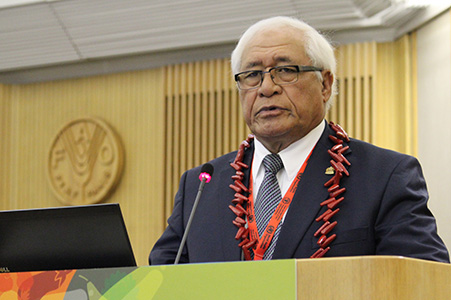 |
| Tuitama Leao Talalelei Tuitama, Minister of Health, Samoa |
|
 |
 |
 |
 |
|
 |
 |
 |
 |
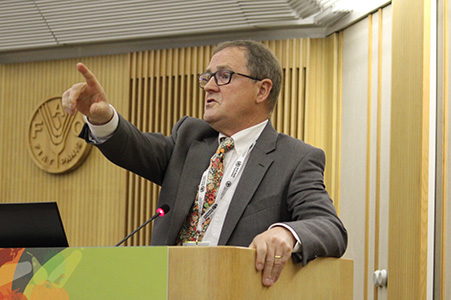 |
| Barrie Margetts, University of Southampton, United Kingdom |
|
 |
 |
 |
 |
|
 |
 |
 |
 |
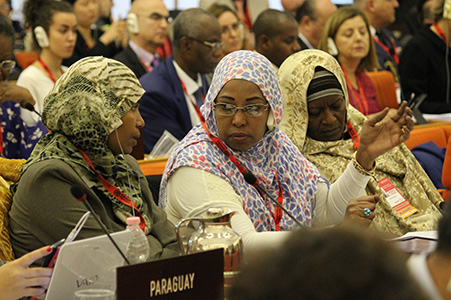 |
| Participants during the roundtable |
|
 |
 |
 |
 |
|
 |
 |
 |
 |
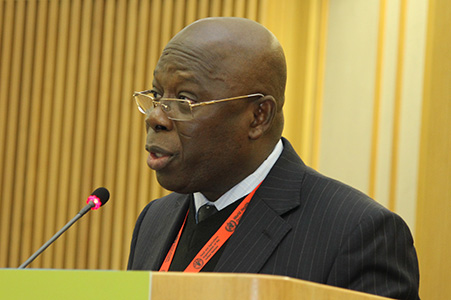 |
| Enoch Hemans Cobbinah, Ministry of Education, Ghana |
|
 |
 |
 |
 |
|
 |
 |
 |
 |
During an afternoon roundtable on nutrition governance, Shawn Baker, Director of Nutrition, Bill & Melinda Gates Foundation, called the challenges of nutrition less about science than about the politics of making it happen.
Germán Gonzalez, Secretary for Food and Nutritional Security, Guatemala, spoke on the adoption of a National Food Security and Nutrition System. He said that nutrition was more than a government responsibility, underscoring the role of civil society and the private sector.
Zahra Abhollah, Ministry of Health and Medical Education, Iran, discussed her country’s experiences with nutrition governance, and how good governance or its absence impacts on nutrition outcomes.
During the discussion, participants raised issues related to, inter alia: WTO rules and regulations that undermine nutrition; ensuring the voices of the poor and small farmers are heard in the decision-making process; and increasing the visibility of nutrition. |
|
 |
 |
 |
 |
 |
 |
 |
 |
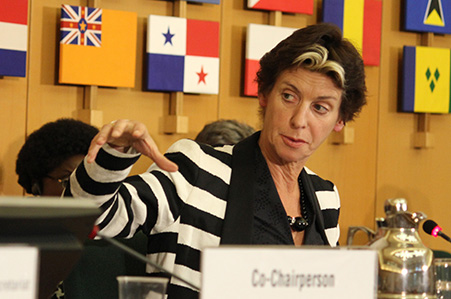 |
| Gerda Verburg, Permanent Representative of the Netherlands to FAO and Chair of the Committee on World Food Security |
|
 |
 |
 |
 |
|
 |
 |
 |
 |
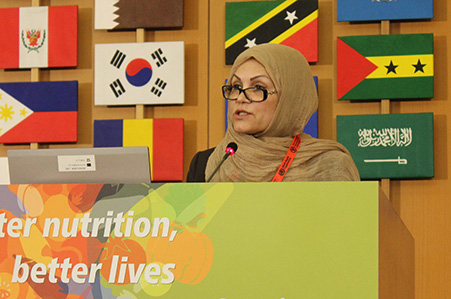 |
| Zahra Abhollahi, Ministry of Health and Medical Education, Iran |
|
 |
 |
 |
 |
|
 |
 |
 |
 |
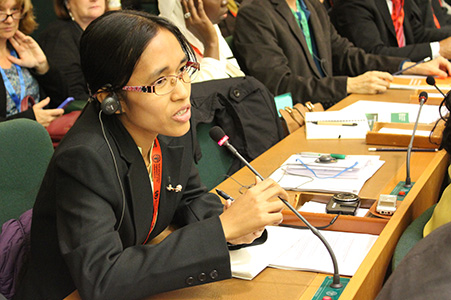 |
| Participant from Myanmar making an intervention in the roundtable |
|
 |
 |
 |
 |
|
 |
 |
 |
 |
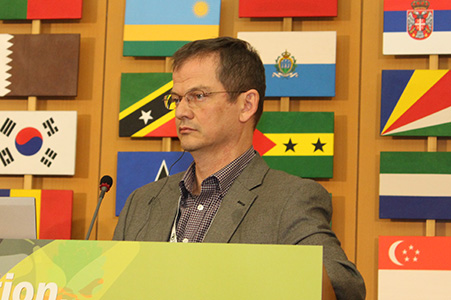 |
| Shawn Baker, Director of Nutrition, Bill & Melinda Gates Foundation |
|
 |
 |
 |
 |
|
 |
 |
 |
 |
During an afternoon roundtable on nutrition accountability, Lawrence Haddad, IFPRI, spoke on whether current accountability mechanisms work, emphasizing the difficulty in tracking government spending on nutrition.
Cristina Isabel Lopes da Silva Monteiro Duarte, Minister of Finance and Planning, Cape Verde, emphasized that government needs to adopt accountability mechanisms in order to realize nutritional goals and that using metrics on indicators, such as gender and nutrition, are vital to achieving nutrition accountability.
Mary Mubi, Former Permanent Representative of Zimbabwe to FAO, said the post-2015 development agenda provides benchmarks to guide nutritional improvements. |
|
 |
 |
 |
 |
 |
 |
 |
 |
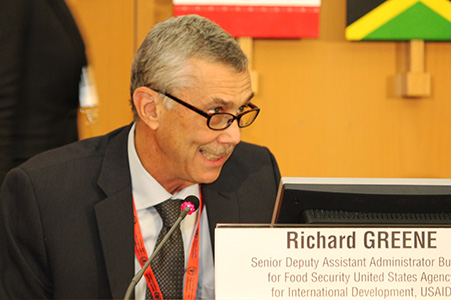 |
| Richard Greene,Senior Deputy Assistant Administrator, Bureau for Food Security, United States Agency for International Development |
|
 |
 |
 |
 |
|
 |
 |
 |
 |
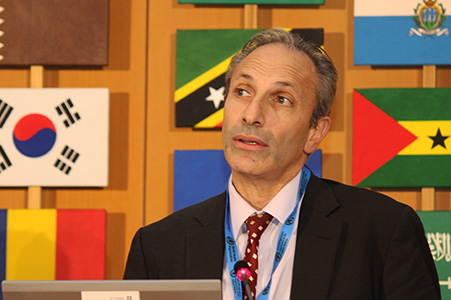 |
| Lawrence Haddad, International Food Policy Research Institute |
|
 |
 |
 |
 |
|
 |
 |
 |
 |
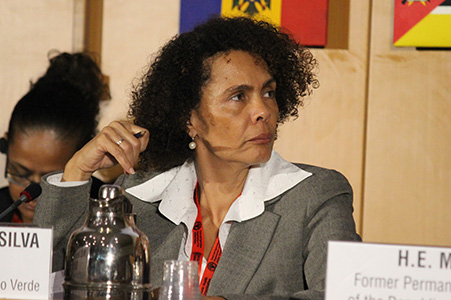 |
| Isabel Lopes Da Silva Monteiro Duarte, Minister of Finance and Planning, Cape Verde |
|
 |
 |
 |
 |
|
 |
 |
 |
 |
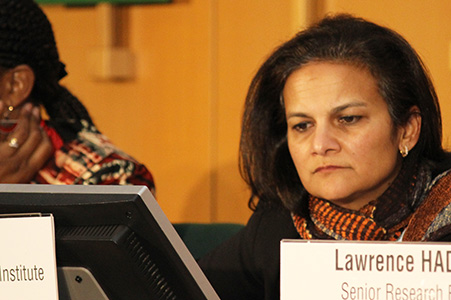 |
| Asma Lateef, Bread for World Institute |
|
 |
 |
 |
 |
|
 |
 |
 |
 |
Side Event: Promoting and Achieving the Zero Hunger Challenge: UN at Expo Milano 2015 and South-South Cooperation in Latin America and the Caribbean |
|
 |
 |
 |
 |
 |
 |
 |
 |
Moderator Marcela Villarreal, FAO, said South-South cooperation was an example of solidarity, which Pope Francis referred to in his statement. FAO Director-General José Graziano da Silva said nutrition must be placed at the core of government agendas, and that food security cannot be decoupled from nutrition security, noting “a coin is only valuable if it has two sides.”
Maurizio Martina, Italian Minister of Agricultural, Food and Forestry Policies, said the ICN2’s work would feed into the Expo 2015 to be held in Milan. He said over 125 countries would participate in the Expo, where on-the-ground experiences would be shared and lessons learned.
Eduardo Rojas, UN Commissioner-General for Expo 2015, and Roberto Arditti, Director of Institutional Affairs, Expo S.p.A., discussed details of the Expo, noting that ICN2 results would be presented at the Expo, including measures adopted by governments and for achieving goals for 2025. They discussed a crosscutting approach to provide greater visibility to the issue and more opportunities to raise awareness in populations, and said the Expo aims to show visitors that ending hunger in our lifetime is possible. The speakers emphasized that ICN2 and the Expo will impact on the post-2015 development agenda, and that the three are mutually complementary.
Representatives of Argentina, Brazil, Colombia, Ecuador and Venezuela then presented initiatives of South-South and Triangular Cooperation for Food Security and Nutrition in Latin America and the Caribbean. |
|
 |
 |
 |
 |
 |
 |
 |
 |
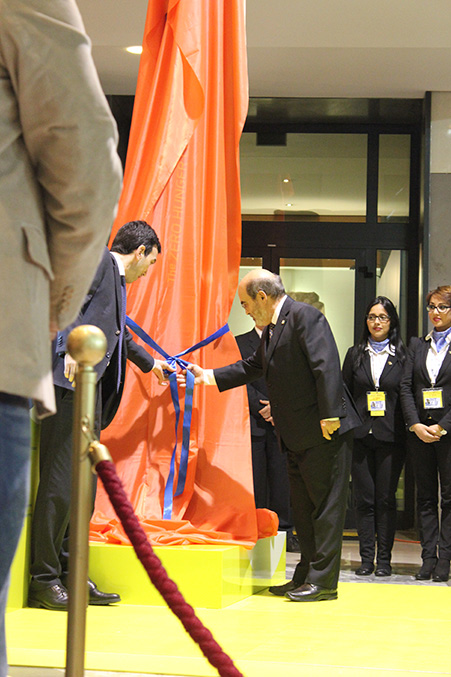 |
| Inauguration of the UN Spoon Installation for Expo Milano 2015: Maurizio Martina, Italian Minister of Agricultural, Food and Forestry Policies, and José Graziano da Silva, Director-General of the FAO |
|
 |
 |
 |
 |
|
|
 |
 |
 |
 |
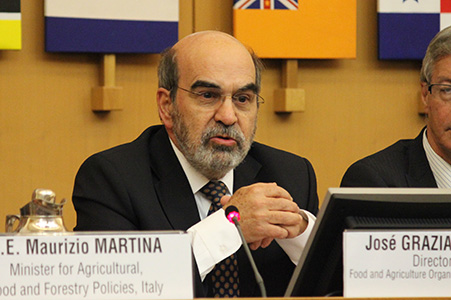 |
| José Graziano da Silva, Director-General of the FAO |
|
 |
 |
 |
 |
|
|
 |
 |
 |
 |
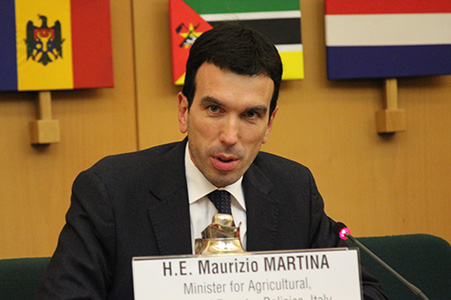 |
| Maurizio Martina, Minister of Agricultural, Food and Forestry Policies, Italy |
|
 |
 |
 |
 |
|
|
 |
 |
 |
 |
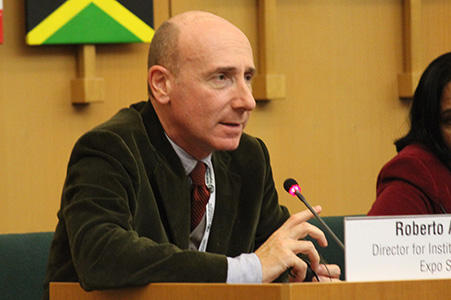 |
| Roberto Arditti, Director of Institutional Affairs, Expo S.p.A. |
|
 |
 |
 |
 |
|
 |
 |
 |
 |
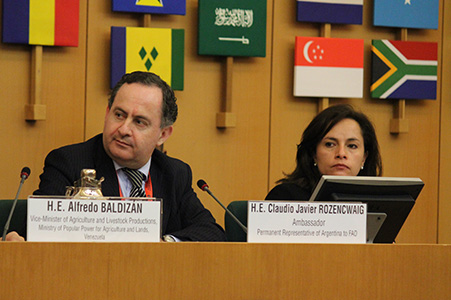 |
| Claudio Javier Rozencwaig, Argentina, and Michela Espinosa Reyes, Food Security and Nutrition, Colombia |
|
 |
 |
 |
 |
|
 |
 |
 |
 |
Side Event: Accounting for Nutrition and Hunger - Global Nutrition Report and Global Hunger Index |
|
 |
 |
 |
 |
 |
 |
 |
 |
Lawrence Haddad, International Food Policy Research Institute (IFPRI), presented the Global Nutrition Report, which contains over 80 indicators for 183 countries. Noting that nutrition provides a foundation for the SDGs, he deplored that nutrition is only mentioned once among the 169 targets within the proposed SDGs. He said the report underlines: that multiple burdens are a “new normal”; notable country advances; the need to scale up nutrition programmes quantitatively and qualitatively; and that nutrition accountability needs to be strengthened.
Tom Arnold, SUN Movement, on behalf of the Global Hunger Index, said that the Global Hunger Index Report is composed of the index and a specific theme, which, in 2014, is on hidden hunger. He noted that the recommendations arising from this report are in line with themes emerging from ICN2 and from the Global Nutrition Report, namely mainstreaming nutrition integration and accountability cross-sectorally.
Noting that Ireland’s commitment on hunger and nutrition remains unabated, Ann Derwin Department of Agriculture and Food, Ireland, announced that 20% of Ireland’s ODA is allocated to nutrition and will double by 2020. |
|
 |
 |
 |
 |
 |
 |
 |
 |
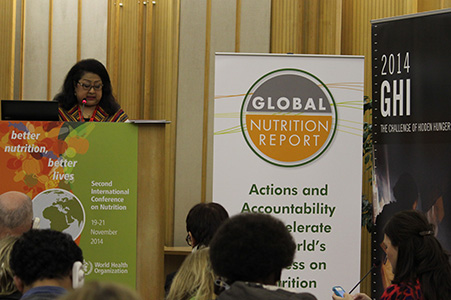 |
| Ibu Nina Sardjunani, Indonesia |
|
 |
 |
 |
 |
|
 |
 |
 |
 |
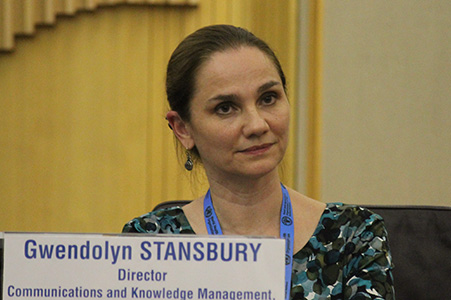 |
| Gwendolyn Stansbury, IFPRI |
|
 |
 |
 |
 |
|
|
 |
 |
 |
 |
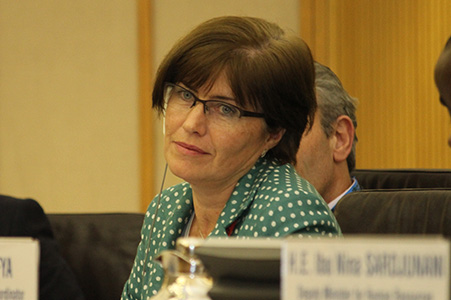 |
| Ann Derwin, Department Of Agriculture and Food, Ireland |
|
 |
 |
 |
 |
|
Funding for coverage of this conference has been provided by FAO
|
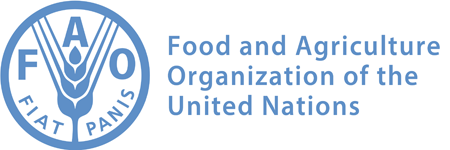
|
 |
 |
 |
 |
Daily Web Coverage
(Click on the following links to see our daily webpages)
|
|
|
|
|
 |
 |
 |
 |
|
|
|
|